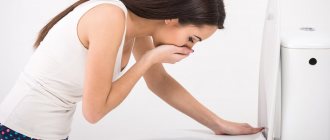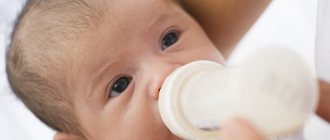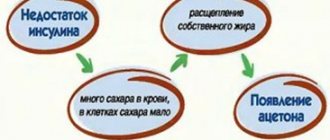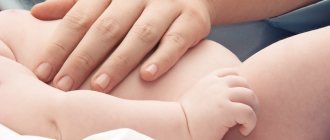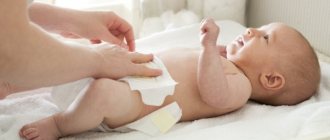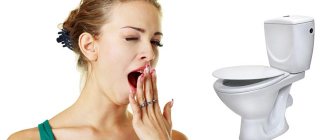All children, both infants and preschool children, suffer from digestive disorders. It is characterized by dilution of stool, increased frequency of bowel movements, and the presence of pathological impurities.
Diarrhea with mucus is a common digestive disorder in children.
Attention! Diarrhea with mucus in a child can pose a health hazard because it is accompanied by the removal of large amounts of fluid from the body, loss of nutrients and electrolytes, which leads to dehydration, intoxication and exhaustion of the child’s body.
What causes mucous diarrhea in children?
Take care of your health - save the VKontakte link
The digestive process in children has its own characteristics, since every day the child’s body gets acquainted with new foods, harmful compounds, and is also influenced by various microbes. Therefore, diarrhea with mucus is quite common in infants and young children. Experts do not regard bowel upset or diarrhea as independent diseases, but are a sign of certain digestive disorders, as well as one of the symptoms of a number of diseases.
Thus, diarrhea with mucus in an infant can develop due to the following reasons:
- violation of the diet of a nursing mother when feeding breast milk;
- dysbiosis or intestinal dysbiosis that occurs due to digestive disorders;
- binge eating;
- lactase deficiency;
- intolerance to cow's milk or artificial nutrition (formula);
- intestinal infections;
- intolerance to certain foods;
- improper introduction of supplementary feeding or complementary feeding;
- period of teething;
- congenital pathologies of the digestive organs;
- severe infectious and inflammatory diseases.
If a breastfed baby's stool has a liquid consistency and mucus, this may be due to low-quality or unsterile breast milk. The problem can be eliminated by conducting a laboratory analysis of the mother's milk and changing the diet, eliminating foods that cause diarrhea. As you can see, in children, stool disorder is caused by a change in diet and a disturbance in the microflora.
Improper introduction of complementary foods can cause diarrhea with mucus in an infant
In older children, diarrhea occurs due to exposure to external factors or the development of a number of diseases. The causes of diarrhea with mucus in an adult child may be:
- consumption of expired products or poor quality food;
- overexertion or stressful conditions;
- fermentopathy;
- enterocolitis;
- food poisoning;
- acute intestinal infections;
- diseases of the digestive system;
- dysbacteriosis caused by taking antibiotics.
A common and quite serious cause of diarrhea with mucus in children is intestinal infections of a viral or bacterial nature, in particular enteritis, enterocolitis. In this case, symptoms such as abdominal pain and fever are observed.
With the development of dysentery, the stool acquires a mucous character with streaks of blood and a characteristic greenish tint, and in the case of salmonella infection, the mucous stool contains orange flakes and is accompanied by a fetid odor.
Prevention
To treat the pathology and avoid relapse, it is necessary to follow preventive measures:
- consume fresh food according to the age characteristics of the child;
- temper the body, strengthen the immune system;
- often walk in the fresh air;
- regularly carry out wet cleaning;
- wash your hands before every meal;
- consume thermally processed foods;
- Do not visit large gatherings of people during an epidemic of viral diseases.
Diarrhea mixed with mucus and blood indicates internal disorders in the body that are associated with pathology of the gastrointestinal tract due to poor hygiene, poor nutrition, and infection. Children most often experience frequent bowel movements due to weak immunity and an undeveloped digestive system. To treat a child, it is important to select the correct therapeutic course, taking into account the age category, the presence of associated symptoms and the cause of the pathology.
We recommend: What can you eat and drink if you have poisoning and diarrhea?
What to do if mucous diarrhea occurs in children?
If a child has diarrhea with mucus, and the mother does not know what to do, you should consult a doctor. Most likely, after questioning, he will indicate the need to implement a number of therapeutic measures to stop it. First of all, you should remain calm and not panic. After assessing the severity of the child's condition, treatment can begin. At home, doctors recommend the following steps:
- limit the child’s food intake, which, however, does not apply to infants;
- replace food with plenty of mineral water, rehydron solution, herbal teas from fennel and chamomile;
- ensure regular intake of sorbents - smecta, atoxil, activated carbon. Along with the use of electrolytic solutions, taking these drugs is considered mandatory, regardless of the reasons that caused the intestinal disorder.
Important! Throughout the entire period of treatment, the child must follow a strict diet, which includes the following set of products: tea, crackers, boiled potatoes, rice broth or boiled rice, buckwheat porridge, vegetable broths, bananas, infusions of rose hips and blueberries.
Methods for identifying and eliminating mucous diarrhea in children
If the treatment measures taken are ineffective, you should call a pediatrician at home or go to the clinic. Here the child will be diagnosed based on laboratory tests, which include:
- blood analysis;
- stool analysis for dysbacteriosis, worm eggs;
- stool culture for rotaviruses, staphylococci, dysentery and typhoid parasites.
You should contact a pediatrician or gastroenterologist if your child experiences the following signs:
- nausea;
- vomit;
- temperature increase;
- the appearance of weakness and apathy;
- increased frequency of bowel movements;
- change in the nature of bowel movements;
- child's refusal to eat and drink;
- the appearance of signs of dehydration: drowsiness, dry skin.
For diarrhea with mucus, the diagnosis is made based on laboratory tests of blood and stool
Treatment
As the main treatment, the doctor prescribes drug therapy. Depending on the cause that caused the development of diarrhea with mucus, he may recommend taking enzyme preparations - festal, mezim, creon. In case of disorder, probiotic drugs are considered effective: Linex, Enterol, Laktomun, Bifiform. If diarrhea is accompanied by pain, you can prescribe paracetamol, which will alleviate the child's condition.
Recently, bacteriophages, such as intestibacteriophage, have been used as therapeutic drugs for staphylococcal or Klebsiella diarrhea. For some diseases, the doctor may prescribe the intestinal antiseptics nifuroxazide.
Diarrhea is a common occurrence in both children and adults. Diarrhea can be caused by a variety of reasons.
Diarrhea with mucus in a child is not always a sign of serious pathological problems. But this option should not be ignored either.
What to do if you have diarrhea? To protect your baby, it is better to seek help from a specialist. An examination should be carried out immediately if diarrhea is frequent and profuse.
The general condition of the child, as well as body temperature, is also important. Timely assistance will help to overcome the root cause in time and prevent complications.
When medical attention is needed
If a child has diarrhea with mucus, the pediatrician will tell you what to do. If the liquefied stool was once, there are no other signs of an infectious disease. But for frequent diarrhea, consultation with a pediatrician is recommended. An increase in the child’s body temperature signals the presence of an inflammatory process in the body. Symptoms requiring medical attention:
- In addition to mucus, there is blood in the stool. It is forbidden to treat the baby yourself. The cause of blood clots is the inflammatory process occurring in the child’s intestines. Hospitalization and a thorough examination are required, on the basis of which therapy is prescribed.
- Attachment of vomiting.
- The mucous feces acquired a green tint. The reason is the penetration of staphylococcus into the body. The inflammatory process in a child’s body requires urgent hospitalization, where therapy with antibacterial drugs is prescribed.
- Drowsiness.
- The elevated temperature does not decrease after taking antipyretic medications.
- Pale and sticky skin.
- The number of bowel movements exceeds 8–10 times a day. This is dangerous for children under one year old.
- The child is lethargic and capricious.
- Loss of appetite.
- Rare urge to urinate.
After transport to the hospital department, the child’s blood will be taken for a general analysis. The result can reveal the severity of the disease, the symptom of which is diarrhea with mucus.
Feces will be taken for coprogram analysis, which will show the presence of dysfunction of enzyme metabolism, the functioning of the pancreas, and determine the localization of inflammation in the intestines. The coprogram identifies the type of microbe that caused the digestive system.
The doctor will order a stool test to identify bacteria. With its help, it is determined which pathogenic organisms caused the disruption of the digestive system. Namely: Klebsiella, Staphylococcus aureus, Proteus, Enterococcus. Children's feces are taken for analysis to identify worms, dysentery, rotavirus or staphylococcus.
Is it dangerous? Etiology and causes of diarrhea with mucus
Many parents, noticing diarrhea with mucus in their child, begin to panic and take rash actions. Under no circumstances should you prescribe treatment yourself.
Self-analysis without a confirmed diagnosis should not be taken seriously. Only a specialist, after a thorough examination, will determine the diagnosis and establish the etiology of the disease.
Loose stools in children under 2 years of age are normal. Often this is a normal reaction of the stomach to the food received. The appearance of diarrhea can be affected by ordinary overeating or, in turn, by starvation.
There is no need to ignore individual predisposition. If one person has hard and mushy stools, another person will have liquid stools as normal.
Climate change also provokes a similar manifestation of the organism.
Diarrhea with mucus in babies under one year of age occurs when complementary foods are introduced. Parents need to understand that it is not just that there is an approximate food schedule for each age.
It is possible that the digestive tract is not yet prepared for such food and cannot cope with the load.
In this case, diarrhea occurs suddenly and goes away within 6-12 hours. At the same time, you do not need to take any medications.
It is recommended to examine the child for individual intolerance to any product. Feeding should be fractional, frequent and in small portions.
Any food should be introduced gradually and the body’s reaction should be observed. Any changes need to be analyzed and stopped. If the stomach is not yet ready to accept this food, then return it to the diet after some time.
Teething can also cause diarrhea with mucus. In addition to diarrhea, the child feels discomfort and pain. It is likely that the temperature will also rise.
Other common reasons:
- Entry of intestinal pathogens and pathogenic microorganisms into the body. The causative agents are: Shigella, dysenteric amoeba, campylobacter, aeromonas, enteroinvasive and enterohemorrhagic coli. Microorganisms: Giardia, rotavirus, cryptosporidium, enterovirus, salmonella, enteropathogenic and enterotoxigenic coli. If ingested, diarrhea also causes fever, low blood pressure, weakness, nausea and vomiting.
- Worm infestations. When parasites have grown in a small body, there is nothing surprising in the appearance of diarrhea with mucus. Additional signs include fever and abdominal pain. Before prescribing treatment, the doctor must find out what type of parasite it is.
- Dysbacteriosis. Diarrhea in a child occurs when the digestive system is not functioning correctly. The stool also takes on an unpleasant odor.
- Maternal malnutrition. If a child is fed breast milk, then any changes in the mother’s diet affect the child’s condition. You need to follow the diet especially carefully in the first months while the body and digestive system have not yet become stronger and adapted to life outside the womb.
- Lactose intolerance. In this case, you need to exclude all dairy products from the child’s diet. The exception is breast milk. You will probably have to choose a different mixture.
- Pathological diseases in the digestive tract.
- Recently suffered infectious-inflammatory diseases.
Symptoms
Symptoms vary greatly depending on the cause. Up to 2 years, the exact signs can be more difficult to determine. This moment is also made difficult by the child’s silence.
The baby cannot yet accurately tell about his problems and parents have to figure it out and observe.
Diarrhea is just a symptom that appears as a result of improper functioning of the digestive system.
Loose stools can be caused by an infectious disease. In most cases, mucus is a consequence of intestinal infections.
Since the baby does not yet know how to maintain proper hygiene and always strives to taste everything, there is a possibility of poisoning. In case of poisoning, the following symptoms are observed: diarrhea, vomiting, abdominal pain.
If there is blood in the stool, then most likely there is damage to the rectum. The child will definitely cry or indicate pain in the anus.
Change in color of diarrhea
If a child has diarrhea with green mucus, most likely poisoning has occurred or he has eaten some product of a similar color. Perhaps this color was the result of taking antibiotics.
Streaks of blood in the stool may be a consequence of hemorrhoids. This is a rare phenomenon in children, but it is also not worth denying.
Even a child less than one year old may have a problem with dilation of the rectal veins. In this case, the mucus will come out mixed with blood.
Intestinal problems are often caused by pathogenic microorganisms. They provoke disruptions in the functioning of the organ. Blood in the stool is a consequence of rupture and damage to the intestinal mucosa.
The most dangerous is considered to be feces with black mucus. This certainly indicates serious damage and pathology within the body. The child urgently needs specialist help and a complete diagnosis.
Black stool with mucus indicates bleeding, which occurs when:
- Oncology.
- Dilatation of the veins of the esophagus.
- Polyphus.
- Stomach and duodenal ulcers.
In addition to diarrhea, other symptoms are observed: weakness, pallor, dizziness, headaches, lethargy, fatigue. Due to severe blood loss, anemia develops.
Only after a special diagnosis by a doctor can one judge the pathology.
Bleeding in a child inside the body can be detected using FGDS and colonoscopy. A stool and blood test is required.
There is no need to panic prematurely if your child has black diarrhea without fever.
This happens if before that he took activated carbon or a vitamin-mineral complex. Parents need to analyze what happened the day before and what the baby ate.
Newborn babies also pass black diarrhea. This is normal in the first days of life. Thus, the body gets rid of meconium. Yellow diarrhea with mucus suggests an inflammatory process within the body.
Normal stool in a baby
Diarrhea is an increase in the frequency of bowel movements. The intestinal motor function of a one-month-old baby is quite energetic, which is manifested by frequent bowel movements: in the first two weeks in a newborn - 3-5 times, during the first year of life - 1-3 times a day, in a one-year-old child - 1-2 times a day. In infants, the process of defecation is a spontaneous (reflex) act, and starting from two years of age, bowel movements are a voluntary (conscious) process.
The child's first bowel movement occurs during the first day of life and is called meconium (original feces). It consists of epithelial cells, bile, enzymes and has a greenish-black color. The manifestation of meconium is necessarily recorded in the developmental history of the newborn, as this indicates intestinal patency. The stool of a breastfed baby is yellow in color and has the consistency of liquid sour cream with a sour odor.
Diarrhea with mucus without fever: diagnosis and treatment
If your child develops an illness, you should contact your pediatrician. If problems are detected, he can refer you to specialized specialists.
First of all, it is necessary to examine the stool for the presence of dysbacteriosis or pathogenic microorganisms. During the examination, staphylococci, enterococci, Klebsiella and Proteus can be detected.
A stool analysis will also show the level of beneficial microorganisms and lactobacilli in the intestines. You will have to wait about 10 days for the result.
If a child’s diarrhea is caused by helminthic infestations, they will be detected during analysis. Some types of parasites cause green, runny stool. This diarrhea will be periodic.
You will also have to take a blood test. Based on this, the pediatrician can prescribe a coprogram. This type of diagnosis will establish the general condition of the gastrointestinal tract.
What to do if a child has loose stools? Parents need to know about the rules that must be followed in case of such an illness. Important Tips:
- Prevent dehydration. What can I do to restore electrolyte levels when I have severe diarrhea? It is recommended to periodically give the drug Regidron or other saline solutions. You can prepare such a solution at home if you cannot purchase the product at the pharmacy.
- It is advisable to remove complementary foods for a while. Breast milk or formula is suitable for food.
- The room must be ventilated regularly.
- Older children also need to limit their food intake. Especially do not give rough food and foods rich in fiber. It is also worth excluding dairy products.
- If a child has a fever, antipyretic medications are allowed.
- What to do if you have pain? In this case, children are given No-shpa.
- With frequent and profuse diarrhea, the baby can be helped to cope with the discomfort. It is advisable to wash the child after each bowel movement and lubricate the anus with an emollient cream.
- After treatment, you will have to follow the diet for some time.
Conclusion
Diarrhea is a serious symptom associated with digestive problems. If you experience severe diarrhea that does not stop for more than a day, you should consult a doctor.
Additional symptoms cannot be ignored. This includes: fever, vomiting, the presence of mucus or blood.
What to do? You cannot make a diagnosis and prescribe treatment on your own. You can help your child cope with discomfort and provide first aid. Medicines are taken only with the permission of a doctor.
First aid for a baby
If a child develops diarrhea with mucous impurities, you should immediately consult a doctor. This is especially important when such a symptom occurs in a baby. Young children are at risk of experiencing dangerous symptoms of dehydration.
First of all, your child needs to drink plenty of fluids. Pure still water is suitable for this. You can also use tea without sugar. Liquids should be given even to babies who are fed breast milk.
Water should be given in small volumes. Gradually the amount should be increased. If this recommendation is not followed, there is a risk of vomiting.
Before the doctor arrives, you need to focus your diet on the baby’s appetite. Usually, when dangerous symptoms are present, children lose their appetite. But if you feel hungry, it is important to continue breastfeeding your baby. And you can also give your baby a cracker or biscuits.
If severe diarrhea and mucous masses appear in the stool, you should immediately consult a doctor. The pediatrician will select the optimal medications. Before a specialist arrives, you can take the following measures:
- If diarrhea occurs in combination with elevated body temperature, it is necessary to cool the baby's body. To do this, wipe it with a cool, damp towel.
- If it is impossible to get quick medical help, sorbents should be used. Smecta is suitable for this purpose. You can also give your child activated charcoal.
- If diarrhea appears in an infant after the introduction of complementary foods, the new product should be discontinued. In such a situation, the stool returns to normal within 24 hours. During this period, you need to give the baby a lot to drink.
